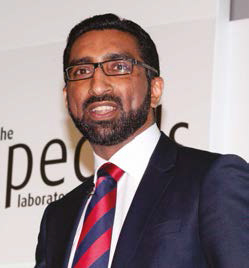Avicenna conference: SCR lowdown
In News
Follow this topic
Bookmark
Record learning outcomes

Pharmacists' newly granted access to the summary care record (SCR) will help to showcase the difference they make to patient care and safety, as well as helping to pave the way towards full read and write access, Mohammed Hussain, systems commissioning manager, NHS England, told delegates at the Avicenna UK conference in September (reports Charlotte Rixon).
€The most powerful thing about the SCR is that it makes visible what we do. We resolve queries all the time but we haven't had the tools to document it or record what we are doing until now,€ he said. Mr Hussain reassured pharmacists that accessing the SCR was quick and simple, compatible with all GP systems, and would not add to their time pressures.

Hussain €“ access quick and simple
In fact, the pilot project found that in 82 per cent of cases, patient waiting times were reduced. He also highlighted findings from the pilot, which showed that the majority of SCR viewings occurred within GP hours, although many also took place during evenings and weekends, and that pharmacists tended to access the SCR when they were busiest. Patient records were viewed for various reasons, including checking for drug interactions and allergy status, as well as to assist in MUR and NMS consultations.
€Pharmacists were accessing the SCR rather than disturbing the GP or being put on hold and asking the reception staff to read the record over the phone. The SCR is available 24/7 and takes just 15 seconds to view.€
Despite the fact that SCR access will improve pharmacy workflow, Mr Hussain argued that pharmacists require full access to patient records in order to maximise their contribution to patient care. He told the conference that a pilot was in development which would allow pharmacists to view and update an enriched record with patient consent. €One of the limitations of the SCR is that it does not contain diagnoses.€ he said.
€These have to be inferred from prescriptions and the objection to pharmacists providing urgent care is that they don't have access to full patient records. €Currently, 40 per cent of calls to NHS 111 are about repeat prescriptions, yet only 1 per cent end up with a community pharmacy. Full access could turn that triangle upside down.€
